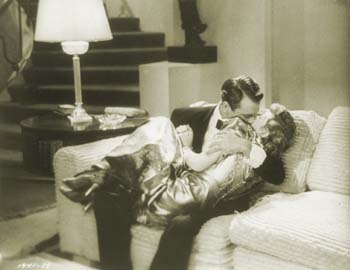Sturges Urges
The screwball comedies of Preston Sturges still exemplify the genre's zest
By Richard von Busack
TO TAKE the angst out of the holiday season, a half-dozen Preston Sturges comedies are being revived at the Stanford Theater in Palo Alto during the next month (on double bills with a Katharine Hepburn retrospective already under way). The now-cultish director's ascendance and subsequent fizzle are part of the legend of Hollywood talent squandered--a parallel to the story epitomized by, and almost exactly contemporary with, Orson Welles.
Both Sturges and Welles were "boy wonders," writer-producer-directors whose careers were neatly matched in time by studio disfavor and European exile. But Welles somehow kept making films in Europe, and Sturges was a 42-year-old boy when he directed his first movie, The Great McGinty in 1940.
Sturges, whose life resembled a screwball comedy peopled with such real-life comedic types as Isadora Duncan and Alistair Crowley, was an inventor, an expatriate and an ambulance driver during World War I. After years as a versatile screenwriter, he began directing a streak of comedies that defined the highest and the best the screwball genre ever knew.
In the six films scheduled at the Stanford Theater, one can see how Sturges blasted Hollywood's moral code into cobwebs with innuendo, how he composed some of the most ringing comic dialogue in the American cinema's history, and how he led the most unlikely actors--ham-and-eggers like Rudy Vallee, William Demarest and Eddie Bracken--into comedic Valhalla.
Sturges can be somewhat inhuman in his comedy; he's not warm-hearted, and he wasn't above racist gags--as exemplified by an eye-rolling comedian named Snowflake. I once took a woman to see his 1944 The Miracle of Morgan's Creek (Dec. 68), telling her I thought it was just about the funniest movie I'd ever seen. But she thought there was nothing amusing about the plot: a pregnant woman bamboozling a lovesick fool who wasn't the father of her child into marriage.
Yet the comic engineering of Morgan's Creek--"nun on a roller coaster" is the way critic James Agee described it--still stymies today's moviemakers. The story outwitted the ban on tales of bastardy, using sacrosanct subjects like the U.S. Army and Christmas to legitimize illegitimacy. It combines vinegary dialogue (lawyer Porter Hall's bracing opinion on the history of matrimony) with bold slapstick (Demarest's sensational pratfall).
The Miracle of Morgan's Creek contains one other miracle: the performance by Diana Lynn as Emmy, a 14-year-old girl who is the sanest person in the picture. She's the one who figures out the scheme to find a husband for her pregnant sister, Trudy; the man she picks for the ruse "fits the plan like the skin on a wienie. ... He was made for it, like the ox was made to eat and the grape was made to drink."
THE JUXTAPOSITION of Sturges with Hepburn highlights one element of his skill. It's been noted that women's roles were cut after the war, to remind them of their subservient place after the potentially unwomaning experience of doing men's jobs. Might this have something to do with Sturges' decline as a director in the late 1940s?
His postwar work consisted of only a handful of box-office failures and comedies: the 1948 noir comedy Unfaithfully Yours (Dec. 1315), too murderous to find an audience; a neglected Western parody with the kiss-of-death title Beautiful Blonde From Bashful Bend (1949); virtually nothing afterward.
But in his prime, Sturges was no slouch as a women's director, always unleashing determined women on range-fed leads like Joel McCrea and Henry Fonda. Name a woman character wilier than Veronica Lake's tough working girl in 1941's Sullivan's Travels, more confident than Barbara Stanwyck's confidence woman Eve "Harrington" in the 1941 The Lady Eve (Nov. 2224), more coolly out-for-herself than Claudette Colbert in 1942's The Palm Beach Story (Nov. 1517), possibly Sturges' best.
The Palm Beach Story is a wild tale of a wife trying (hopelessly) to turn courtesan to help her husband's career, fleeing to Palm Beach in the company of the notorious Ale and Quail Club, only to be rescued by the millionaire John D. "Snoodles" Hackensacker III. When Colbert's character spells out her plans for success, she echoes Scarlett O'Hara's "a woman must have everything" edict; unlike Scarlett, she gets it all.
[ Metro | Metroactive Central | Archives ]
This page was designed and created by the Boulevards team.

Embrace to the Finish: Joel McCrea and Claudette Colbert clinch in Preston Sturges' "The Palm Beach Story."
From the November 14-20, 1996 issue of Metro
Copyright © 1996 Metro Publishing, Inc.
![[Metroactive Movies]](/movies/gifs/movies468.gif)